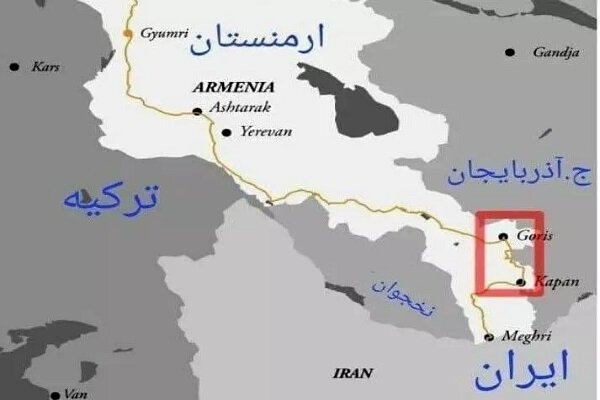Masoud Pezeshkian, Speaker of the Iranian Parliament, traveled today to Yerevan at the official invitation of Armenian Prime Minister Nikol Pashinyan.Armenia is home to some of the world’s oldest churches. Previously, Hassan Rouhani and Mahmoud Ahmadinejad each visited Yerevan twice during their presidencies, while Mohammad Khatami made one visit.
This trip continues Iran’s efforts to deepen relations wiht one of its 15 neighboring countries amid sensitive regional circumstances. According to armenian media reports,an Armenia-Iran business forum in Yerevan will be held as part of this visit’s agenda.
Iran has recently emerged from a 12-day intense conflict with Israel that dealt severe blows to Israeli forces in its latter half, garnering widespread support from regional and global public opinion.Together, on August 7 at the White House-corresponding with Friday, August 8 according to Gregorian calendar-Armenia signed a peace agreement with Baku that includes granting Azerbaijan transit rights through Syunik province in southern Armenia. This corridor provides Azerbaijan closer access near its Nakhchivan Autonomous Republic enclave. The agreement implements Clause 9 of the November 9, 2020 ceasefire accord brokered by Russia following last year’s conflict between Armenia and azerbaijan-routes that echo Soviet-era connections but now revived under new auspices.
Concerns Over 99-Year Land Lease
According to Armenian officials, this new transit route – dubbed “Trump” – has yet to be constructed but is planned on leased Armenian territory for up to 99 years involving an American-Armenian contractor registered under Armenian law.This arrangement raises serious alarms in Tehran.
From Iran’s standpoint, it remains essential that no alteration affects regional political geography. Tehran opposed Armenia’s occupation of Nagorno-Karabakh over recent years and considered plans for a Zangazur corridor involving leased Armenian lands against its national interests-and now similarly views any extraregional presence under such pretexts as conflicting with its sovereign “breathing right.” It fears such corridors could enable Washington’s strategic leverage aimed at blocking Iran’s northbound trade routes linking it with Europe.
While Iranian Foreign Minister seyed Abbas Araghchi noted that Armenians have assured Tehran there will be no U.S. military or private security firms allowed within Syunik province-and contracts between american and Armenian parties are governed strictly by local laws-Iran remains wary due to America’s track record of violating treaties and stretching contractual terms arbitrarily.
This concern over potential closure or control over critical corridors was publicly voiced by President Ebrahim Raisi on August 10 (Gregorian calendar). Simultaneously occurring, former Iranian ambassador Seyed Abbas Mousavi warned about blockade risks in an interview with Mehr News Agency calling for renewed dialog between Armenia and azerbaijan based on mutual understanding.
A key message needs clarity: while iran supports Armenia strategically and historically-for centuries serving as Armenians’ protector against adversity dating back even before they became Christianized as early as the fourth century AD-the current concerns must be acknowledged meaningfully through constructive steps during this visit.
Yerevan should remember how their ancestors were recognized by ancient Persian kings as strategic allies during contests against Rome; how throughout history when Azerbaijan aimed (with foreign backing) at occupying Syunik province enforcing aggressive corridors like Zangazur-it was practically assured support from Iran providing refuge.
though centuries have passed since alliances crossed religious lines-from Roman Christians then through modern European-American allies today-the Iranian plateau continues being Armenians’ sanctuary amidst unpredictable crises.
armenians share profound past-cultural ties linking them deeply emotionally both geographically and socially with Persians; free life for Armenians inside Iran testifies strongly toward enduring bilateral friendship beyond machinations from some external powers.
nonetheless Yerevan must concretely respect Tehran’s position-as a trusted strategic friend long committed sincerely without parallel among regional governments-to protect Armenia’s sovereignty and territorial integrity without compromise.
Iran Is Just One Letter Away From Yerevan
The words “Iran” (ایران) and “Yerevan” (ایروان) differ by only one letter in Persian-a symbolic reminder they share much beyond proximity.
Yerevan knows well that aligning itself within Turkey-Azerbaijan-Washington-led schemes branded differently today risks isolating itself regionally long-term-we saw similar patterns after world War I when Ottoman Turkish hostility profoundly shrank these communities’ territories once again.
The region recognizes the era of Zangazur is conclusively over, unable outmatch iran’s steadfast stand against territorial fragmentation-but challenges persist around Syunik given plans launching new international transit corridors labeled differently yet raising similar concerns regarding geopolitical control.
Unlike Reza Shah Pahlavi who neglected border defense allowing loss of parts westward including areas now called Little Ararat near Nakhchivan creating ongoing geopolitical headaches,
the Islamic Republic meticulously monitors all political-geographical changes opposing even minor shifts firmly designating these lines red zones not open for negotiation or reshaping indefinitely impacting national security interests.
Iran demands uninhibited access onward towards Europe via critical land avenues like those running through landlocked but strategically positioned Armenia which depends heavily on transits afforded by neighborly arrangements accessing open seas.
Hence it is imperative both capitals maintain productive bilateral relations grounded firmly in shared benefits-which ultimately means Tehran refuses any twilight bearing down upon ”Zangazur” that might herald dawns foreseeing unacceptably controlled corridors under dubious external stewardship called ”Trump.”


دیدگاهتان را بنویسید